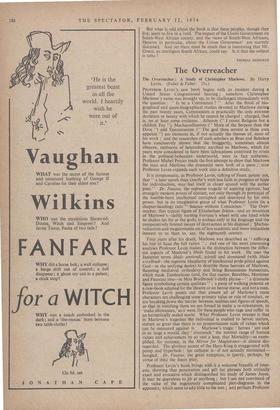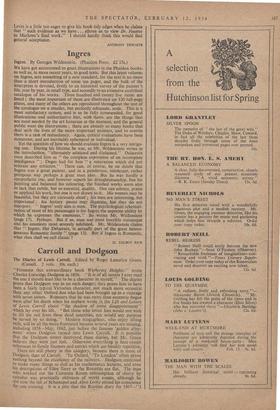The Overreacher
PROFESSOR LEVIN'S new book begins with an incident during a United States Congressional hearing ; somehow Christopher Marlowe's name was brought up, to be challenged immediately with the question : " Is he a Communist ? " After the flood of bio- graphical and quasi-biographical studies devoted to Marlowe during the past twenty years, Communism is practically the only extreme deviation or heresy with which he cannot be charged ; charged, that is, on at least some evidence. Atheism (" I count Religion but a childish Toy "), Machiavellianism (" More of the Serpent than the Dove ") add Epicureanism (" The god thou servest is thine own appetite ") are elements in, if not actually the themes of, most of his work ; and the researches of such scholars as Boas and Bakeless have conclusively shown that the braggartly, sometimes almost obscene, outbursts of heterodoxy ascribed. to Marlowe, which for years were considered to have been fabrications contrived by rivals in the political-bohemian underworld, were in fact authentic. Professor Michel Poirier made the first attempt to show that Marlowe the man and Marlowe the dramatist were both of a piece ;' now Professor Levin expands such work into a definitive study.
It is symptomatic, as Professor Levin, talking of Faust, points out, that" a later epoch than Goethe's with less faith in progress or hope for individualism, may feel itself in closer accord with the earlier poet." Dr. Faustus, the supreme tragedy of aspiring egotism, has strangely modern points of contact, not only through its portrayal of the humble-born intellectual corrupted and destroyed by his own power, but in its imaginative grasp of what Professor Levin (in a chapter-heading) calls " Science without Conscience." The Over- reacher, that typical figure of Elizabethan drama—and an invention of Marlowe's—deftly turning Fortune's wheel with one hand while he shakes his fist at the gods, is archaic only in his language and the comparatively limited means of destruction at his disposal ; yachia- vellianism and megalomania are of less academic and more immediate interest to us than to, say, the eighteenth century.
Four years after his death, Marlowe was described as 't suffering his lust to haue the full raines " ; and one of the most interesting analyses Professor Levin makes is the distinction between the differ- ent aspects of Marlowe's libido found in his work. He uses the Jansenist terms libido sentiendi, sciendi and dominandi (with libido excellendi—the supreme blasphemy of intellectual pride pitted against God—as the unifying desire) to describe those heresies of Marlowe, flaunting mediaeval orthodoxy and firing Renaissance humanism, which made Tamburlaine (and, for that matter, Barabbas, Mortimer and Faustus) into—in Miss Bradbrook's chilly phrase—" a dramatic figure symbolising certain qualities " ; a piece of walking polemic or a case-book adapted for the theatre or an heroic statue, and not a man. Professor Levin points out that almost all of Marlowe's main characters are challenging some primary value or rule of conduct, or are breaking down the barrier between realities and figures of speech, so that in watching them we are forced to make a re-orientation, to 'make allowances,' as it were, for these people who rage and suffer in an hermetically sealed world. What Professor Levin stresses is that in Marlowe's tragedies the individual is exalted to heroic stature, stature so great that there is no proportionate scale of values which can be measured against it. Marlowe's tragic heroes ' are cast in so huge a mould, they overreach ' the normal range of human, values and achievement by so vast a leap, that Mortality—as exem- plified, for instance, in the Mirror for Magistrates—is almost dis- regarded. The glorious ascent of the Hero-King is exaggerated with pomp and 'hyperbole ; his collapse is—if not actually minimised— bungled. Dr. Faustus, the great exception, is (partly, perhaps, by virtue of this) the finest play.
Levin is a little too eager to give his book tidy edges when he claims that " such evidence as we have ... allows us to view Dr. Faustus as Marlowe's final work." I should hardly think this would find general acceptance.
ANTHONY THWAITH



































 Previous page
Previous page